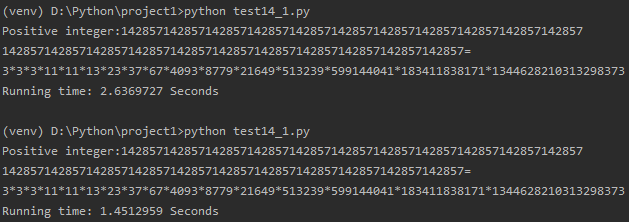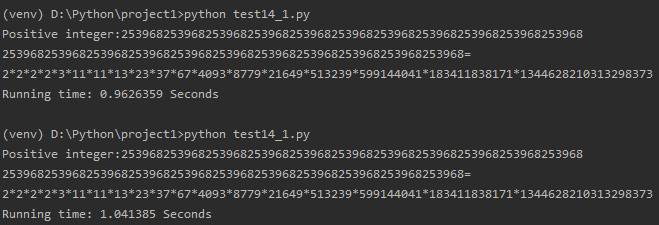【Python】对大数质因数分解的算法问题
【Python】对大数质因数分解的算法问题
- 发现问题
- 尝试分析
- 最后
- 我的代码(C1)
- 百科代码(C2)
发现问题
我是一个初学者,在编写一个分解质因数的代码时,学习到了 Miller-Rabin素数测试算法 和 Pollard-Rho算法 这两个算法。试着编写了一段代码(下称C1),运行后效果还不错,但感觉好像哪里不对或者还可以优化,于是在网上搜索。最后在百度百科上看到了一段代码(下称C2),同样使用了上述两个算法。
运行C2后发现,大多数情况下,运行速度差不多。但发现一个数字a,C2的运行时间比C1慢很多。难道我写的算法更优?
数字a为11段1/7的循环节:142857142857142857142857142857142857142857142857142857142857142857
尝试分析
之后的尝试中,又发现1个数字b,会使得C1陷入死循环。分步解析后得出结论是,卡在了 find(n) 函数上。然后发现最可笑的是输入4无法得出因子2。那应该是我的算法错了吧?
再去理解了一遍 Pollard-Rho算法 ,发现是因为我定义的 find(n) 函数中使用随机函数 f(x)=x^2+a 无法解出因子2,既然如此,加上一个判定即可解决。
数字b为11段(1/7的循环节+111111):253968253968253968253968253968253968253968253968253968253968253968
最后
修复后尝试了一些大数,发现C1确实比C2要快。但我还是不敢确定C1的算法是否正确,还望有人可以指正。
最后尝试一下数字c,算了好久还以为又死循环了,最后C1都运行了2次了C2还没出结果,无奈ctrl+c。看来对于这种大因子的合数分解,这个算法似乎并不好用。
数字c为费马数2^128+1:340282366920938463463374607431768211457
我的代码(C1)
import math
import random
import time
start = time.perf_counter()
# 判断输入是否为素数
def prime(n):
if n in {2, 3, 5, 7, 11}:
return True
if n % 2 == 0 or n % 3 == 0 or n % 5 == 0 or n % 7 == 0 or n % 11 == 0:
return False
t = 0
u = n - 1
while u % 2 == 0:
t += 1
u //= 2
a = random.randint(2, n - 1)
r = pow(a, u, n)
if r != 1:
while t > 1 and r != n - 1:
r = (r * r) % n
t -= 1
if r != n - 1:
return False
return True
# 寻找输入的一个因数
def find(n, a):
def f(x):
return (x * x + a) % n
# 补上因子为2的判定
if n % 2 == 0:
return 2
x1 = random.randint(0, n)
x2 = x1
while True:
x1 = f(x1)
x2 = f(f(x2))
p = math.gcd(abs(x2-x1), n)
if p > 1:
return p
if x1 == x2:
return n
num = int(input('Positive integer:'))
print(f'{num}=')
prime_list = []
while num != 1:
if prime(num):
prime_list.append(num)
break
else:
c = find(num, random.randint(0, num-1))
if prime(c):
prime_list.append(c)
num //= c
prime_list.sort()
print('*'.join(map(str, prime_list)))
end = time.process_time()
print(f'Running time: {end - start} Seconds')
百科代码(C2)
摘自百度百科分解质因数,我加入了统计运行时间和输出显示。
import random
import time
start = time.perf_counter()
def gcd(a, b):
if a == 0:
return b
if a < 0:
return gcd(-a, b)
while b > 0:
c = a % b
a, b = b, c
return a
def mod_mul(a, b, n):
result = 0
while b > 0:
if (b & 1) > 0:
result = (result + a) % n
a = (a + a) % n
b = (b >> 1)
return result
def mod_exp(a, b, n):
result = 1
while b > 0:
if (b & 1) > 0:
result = mod_mul(result, a, n)
a = mod_mul(a, a, n)
b = (b >> 1)
return result
def MillerRabinPrimeCheck(n):
if n in {2, 3, 5, 7, 11}:
return True
elif n == 1 or n % 2 == 0 or n % 3 == 0 or n % 5 == 0 or n % 7 == 0 or n % 11 == 0:
return False
k, u = 0, n - 1
while not (u & 1) > 0:
k += 1
u = (u >> 1)
random.seed(0)
s = 5
for i in range(s):
x = random.randint(2, n - 1)
if x % n == 0:
continue
x = mod_exp(x, u, n)
pre = x
for j in range(k):
x = mod_mul(x, x, n)
if x == 1 and pre != 1 and pre != n - 1:
return False
pre = x
if x != 1:
return False
return True
def Pollard_rho(x, c):
(i, k) = (1, 2)
x0 = random.randint(0, x)
y = x0
while 1:
i += 1
x0 = (mod_mul(x0, x0, x) + c) % x
d = gcd(y - x0, x)
if d != 1 and d != x:
return d
if y == x0:
return x
if i == k:
y = x0
k += k
def PrimeFactorsListGenerator(n):
result = []
if n <= 1:
return None
if MillerRabinPrimeCheck(n):
return [n]
p = n
while p >= n:
p = Pollard_rho(p, random.randint(1, n - 1))
result.extend(PrimeFactorsListGenerator(p))
result.extend(PrimeFactorsListGenerator(n // p))
return result
lis = PrimeFactorsListGenerator(int(input('n:')))
print('*'.join(map(str, lis)))
end = time.process_time()
print(f'Running time: {end - start} Seconds')




